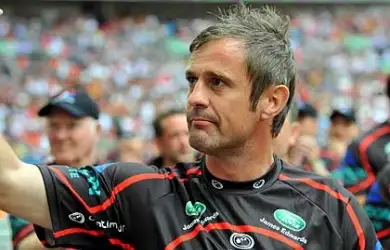Heroic Prescott continued to help doctors as he was dying

Steve Prescott continued to help doctors, even when it became clear that there was no hope for him personally, his widow Linzi has revealed.
Just three weeks before he died in November 2013, Prescott underwent 32 hours of transplant operations in order to help doctors better understand the rare form of cancer which was attacking him.
His pancreas, duodenum, small bowel, stomach and stomach wall were transplanted at Oxford‘s Churchill Hospital as part of the experimental operation.
He was just 39 years old when he died from complications associated with the treatment of pseudomyxoma peritonei, the condition with which he was diagnosed in 2006.
That diagnosis ended his playing career, and he was only given months to live.
But over the next seven years Prescott put himself through a series of gruelling endurance challenges to raise funds for to support fellow cancer sufferers and to help fund research.
His remarkable story has made him a hero in the eyes of the rugby league community.
“It’s amazing to meet Claire finally – when it’s something so rare it makes you feel quite close to them,” Linzi Prescott told BBC North West.
“After diagnosis Steve changed as a person and it moulded the person he became. He turned his sights to helping other people.
“He went through what he went through for somebody else and not for nothing, really.”
One person who has benefitted from the transplant technique is Claire Place, who was diagnosed with pseudomyxoma eight years ago.
When conventional treatment ceased to work, she underwent the radical transplant surgery, and is now feeling much better.
“I feel great,” she said.
“It’s amazing. It’s nice to be able to eat and drink again. Even things like walking the dog is easy again now.”